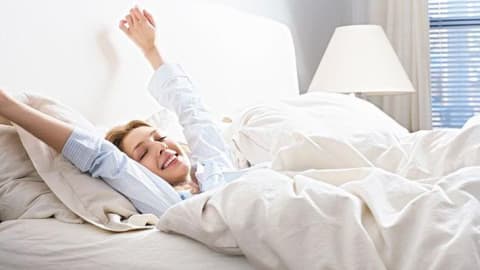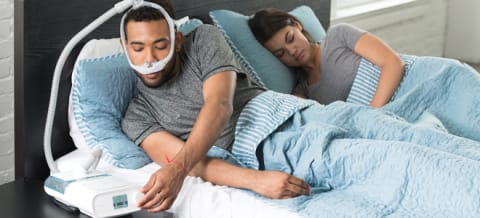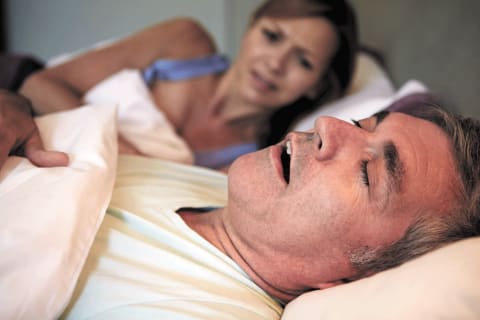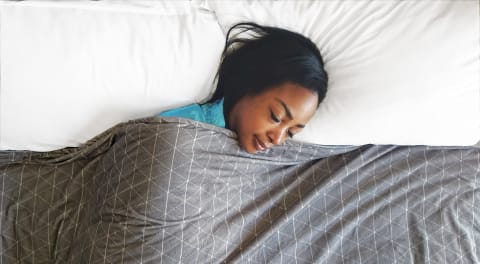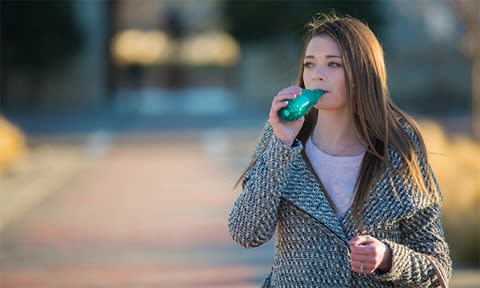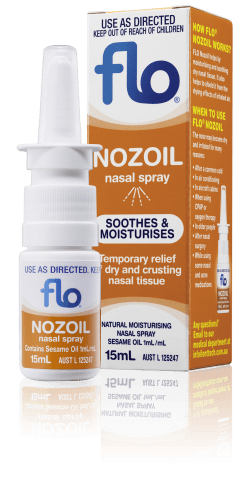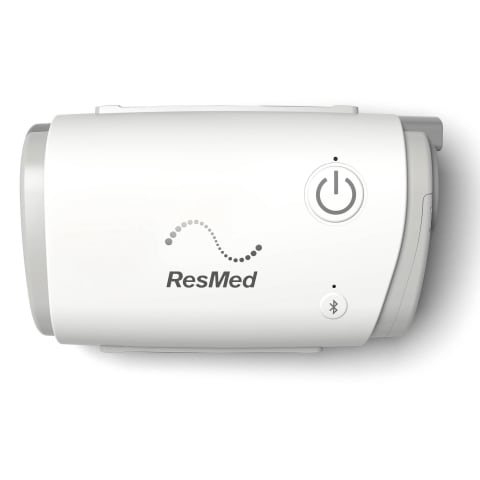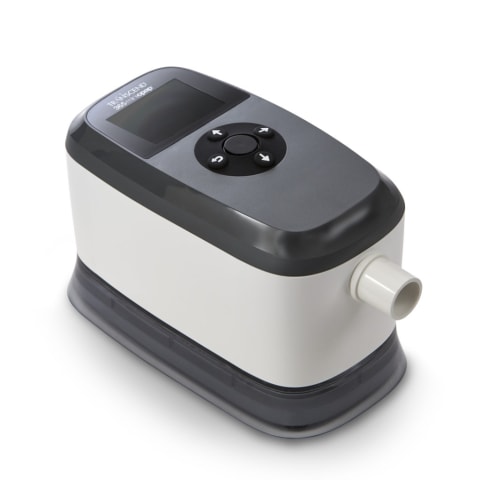Travel CPAP Machines
Getting a good night’s sleep makes traveling all the better. That is why Sove CPAP Clinic carries a wide range of travel CPAP machines, so that whether it’s for work or pleasure, domestic or international, your CPAP treatment can travel with you also. Apart from being smaller and more convenient to travel with, travel CPAP machines have other important features including:
- Cigarette lighter compatibility
- DC Cable Converter compatibility
- Portable extended battery compatibility
These benefits go a long way in ensuring you can stay connected with your CPAP treatment, irrespective of whether you are plugging it into a car, truck, caravan, airplane, boat, or any other vehicle equipped with a suitable power source.
Speak with your doctor first to obtain a proper diagnosis and before commencing CPAP treatment. ALWAYS READ THE LABEL AND FOLLOW THE DIRECTIONS FOR USE. If symptoms persist talk to your healthcare professional.
A commonly asked question is whether travel CPAP machines are just as robust and durable like the standard CPAP machines. The answer is yes. Travel CPAP machines can be used daily as well as for travel.
There are many different brands of travel CPAP machines. The most popular premium brands include ResMed Australia and Philips Respironics. The most popular budget travel CPAP machine is from Transcend.
Using your travel CPAP machine on a plane
CPAP machines are generally allowed on planes as a carry-on. However, it is prudent to check with your airline first, as not every airline permits this, nor its in-flight use, or sometimes medical clearance from a doctor is required. It is highly recommended that this is done as early as possible, as approvals and forms can often take time.
Checklist before you travel:
- Packing your CPAP Machine – When travelling, your CPAP machine should always be packed in the original travel bag. These CPAP bags are typically compartmentalised and padded to provide support and protection for your machine, humidifier and other CPAP parts. It is highly recommended for you to bring your CPAP machine on board your flight even if you are not planning to use it on the plane. By hand carrying the device, it reduces the risk of damage to your machine.
- Packing your humidifier – One of the most important thing to check before you pack up your humidifier chamber into your travel bag, is that the chamber is completely empty of water to avoid water damage to the machine.
- Electrical Specification – Check the voltage range of your machine prior to travel to make sure that it is suitable with the power source at your destination country. Most new CPAP machines these days will have a Universal power supply which will support the voltage range of 100V to 240V. If your machine can only run on a specific voltage, you may need to consider bringing a voltage converter.
- Plug Adapters and extension cords – Not all countries and hotels will have the adapters for the Australian power plug. Therefore you will definitely need to remember to bring an adapter so that you are able run your CPAP machine off the wall outlet. An extension cord may also be helpful in case if the wall outlet is too far out of reach from where you will be placing the CPAP machine at the side of the bed.
- Surge protection – Travel surge protectors will be able to help your machine from any sudden voltage surges. This will protect your machine from any damages in the event of a surge.
- Spare Accessories – Be prepared and bring enough accessories to last you for the duration of your trip. It is always a good idea to bring some extra filters and even spare cushion and headgear if your trip is quite long.
- Distilled water – Make sure you have access to distilled water. Different countries have different hardness of their water and it may damage or corrode your humidifier chamber. Therefore, when travelling, it is always recommended to purchase distilled water for daily use.
- Prescription and/or Doctor’s letter – Take a copy of these documents with you in the event that you will need to show Airport securities or if your machine breaks down and you need to purchase an urgent replacement.
Sove CPAP Clinic is a leading independent provider of Sleep Apnea treatment services, including CPAP treatment. Sove CPAP Clinic carries all major brands including ResMed, Fisher & Paykel, Philips Respironics, Transcend, Weinmann, Apex and Devilbiss.
Sove CPAP Clinic offers CPAP rental of machines and CPAP masks, as well as the sale of new and second hand CPAP machines. CPAP payment plans and price match guarantee available. We ship CPAP Australia wide and CPAP direct to your door.
Every patient’s treatment needs are different, and that is why Sove CPAP Clinic tailors and individualises each package around the patient’s needs. We work with the patient and Sleep Specialists to ensure patients receive optimal CPAP treatment. As a comprehensive sleep service provider, patients can access Sove CPAP Clinic’s service in-clinic, over the phone, via video conferencing and online.
Given the importance of continued treatment compliance, portability has become an important consideration with the design of these machines. Over time, the machines have become lighter and more compact, with multi-voltage power supplies for international use.
For those requiring treatment on long-haul flights or camping trips, many of the newer machines are capable of being used on most commercial aircraft and have the ability for manual or automatic altitude adjustment. External batteries, power-inverters and/or car-battery powering are optional features on some devices.
Frequently Asked Questions
Is the Travel CPAP Machine Compatible with All CPAP Masks?
Compatibility is a key concern for anyone transitioning from a standard CPAP to a travel model. Most travel CPAP machines are designed with flexibility in mind, offering compatibility with a broad range of CPAP masks. This allows users to continue using their preferred mask style and fit, which can make a big difference in therapy comfort and compliance.
However, some compact travel devices have proprietary connections. For example, the ResMed AirMini is engineered to work only with a specific selection of ResMed masks, which limits options unless an aftermarket adapter is used. These adapters are increasingly available, but it’s important to ensure they are reliable and safe.
Sove offers personalised mask fitting services to help you determine whether your current mask is compatible with your travel CPAP or if an alternative is needed. We can demonstrate different mask options in clinic and provide practical solutions to optimise your setup for both comfort and portability. If you’re starting fresh with travel CPAP, we’ll help you select a system that offers the versatility you need for everyday use and travel convenience.
How Noisy Is the Travel CPAP During Operation?
Noise levels are a common concern for both new and experienced CPAP users, particularly when using a device in unfamiliar or shared environments like hotel rooms, planes, or even beside a light-sleeping partner. Fortunately, modern travel CPAP machines are remarkably quiet, with most models operating below 30 decibels. This is roughly equivalent to the sound of rustling leaves or a soft whisper.
The sound a CPAP machine makes comes from both the device itself and the airflow through the tubing and mask. Therefore, selecting a mask with quiet venting technology is just as important as choosing a quiet machine. Our team can help match you with a low-noise combination that suits your therapy requirements and sleep preferences.
We also recommend trialing your travel machine in a quiet room at home before you leave. This allows you to get used to its sound profile and identify any small adjustments that could improve your comfort. Our team is available to support you with these preparations and suggest noise-reducing accessories, such as hose insulation or CPAP pillows that help manage tubing position.
What Is the Average Battery Life of a Travel CPAP?
Battery life is an essential factor when choosing a travel CPAP, especially if your plans involve flights, road trips, camping, or stays in locations where power access is limited. Most travel CPAP devices offer an average of 8 to 16 hours of battery life per charge, depending on your pressure settings and whether you’re using features like humidification.
For users with higher pressure requirements or longer sleep durations, we recommend bringing a secondary power source. External battery packs compatible with CPAP machines are now widely available and designed to be lightweight, compact, and airline-compliant.
At Sove CPAP Clinic, we help our patients understand their specific power needs and recommend the best battery solutions. We also offer guidance on charging cycles, travel adapters for different international outlets, and how to manage power consumption while using features like ramp and auto pressure adjustments. Planning your power supply ahead of time helps ensure your therapy remains consistent and stress-free.
Can I Use the Travel CPAP on a Plane?
The idea of using a CPAP machine on an airplane can feel overwhelming at first, but the good news is that many travel CPAP machines are specifically designed for in-flight use. These devices are small enough to fit into carry-on bags and are often labelled as FAA-approved or compliant with aviation safety standards.
Despite this, it’s still vital to check with your airline before you fly. Each carrier may have different rules regarding the use of medical devices on board, especially when it comes to power access and battery requirements. Some airlines require you to notify them ahead of time or provide documentation, such as a letter of medical necessity.
To avoid surprises, our team can assist you with travel preparation, including providing the necessary documentation and helping you select an FAA-approved battery pack if you plan to use the machine mid-flight. Even if you don’t plan to use it in the air, always pack your CPAP in your carry-on to protect it from potential damage or loss in checked luggage.
What Security Features Are Included to Protect the Device During Travel?
CPAP machines are medical devices and should be treated as such when travelling. Fortunately, most travel CPAP units are sold with specialised carry cases designed to protect against the hazards of travel—from turbulence in the air to bumpy roads and crowded baggage compartments.
These travel cases often include:
- Padded interiors to cushion the machine
- Water-resistant or waterproof linings
- Separate compartments for cords, masks, and accessories
- Reinforced zippers or buckles for added durability
At Sove, we offer a selection of travel-friendly protective cases that meet airline regulations and provide peace of mind. We also recommend labelling your case as medical equipment and keeping a copy of your prescription and product documentation inside. That way, if you’re questioned at security checkpoints, you’ll have everything you need at your fingertips.
Are There Any Additional Accessories Included with the Travel CPAP?
Travel CPAP packages can vary greatly in terms of what’s included. Basic packages generally offer the essentials: the device, a power supply, tubing, and a compact carry case. However, more comprehensive kits may come with a variety of helpful extras that can enhance your travel experience.
Common accessories include:
- Universal power adapters for international travel
- Portable humidifiers or waterless humidification cartridges
- Cleaning wipes or disinfecting sprays
- Battery packs with airline certification
Our store stocks a wide range of accessories specifically chosen for Australian travellers. Our team can walk you through what’s included with each machine and recommend additional products tailored to your destination, lifestyle, and clinical needs. This ensures you’re fully equipped to stay consistent with your therapy on the go.
How Do I Know If the Travel CPAP Is Compliant with Airline Regulations?
Ensuring your CPAP machine is compliant with airline requirements is an important step in travel preparation. Devices approved for in-flight use are typically marked as such in the user manual or on the device itself. Look for labels like “FAA-approved” or “meets airline standards.
Even with the right equipment, we recommend carrying a CPAP compliance letter from the manufacturer, as well as your prescription. These documents can help smooth the process at airport security and during boarding.
Can I Customise My Travel CPAP Machine to Meet My Specific Needs?
One of the greatest advantages of modern travel CPAP machines is their versatility. Despite their compact size, these devices often include customisable settings that allow you to tailor your therapy to your individual requirements.
Common features include:
- Auto-titrating pressure modes
- Adjustable ramp-up settings for gradual pressure increase
- Humidification settings
- Bluetooth connectivity with mobile apps for data tracking
Our team of Respiratory and Sleep clinicians can walk you through how to use and adjust these features, ensuring that your device performs just as well on the road as it does at home. We also help you set up compatible mobile apps so you can track your therapy progress, even while away. For travellers with specific medical or comfort needs, we’ll help configure your device so it delivers personalised, uninterrupted support.
How Can I Ensure That My Travel CPAP Is Safe and Hygienic During Travel?
Hygiene is not only about comfort; it’s about health and the longevity of your CPAP device. When travelling, your equipment may be exposed to new environments, including dust, moisture, and handling by others. That’s why regular cleaning and safe storage are essential.
We recommend packing a dedicated hygiene kit that includes:
- Travel-sized CPAP cleaning wipes or sprays
- Disposable filters
- Extra tubing or mask liners
- Distilled water if you’re using humidification (or knowing where to buy it at your destination)
Are There Any Specific Recommendations for Travelling with a Travel CPAP?
Travelling with a CPAP requires a bit of preparation, but with the right strategy, your device can be a seamless part of your travel routine. Whether you’re flying across the country, embarking on an international holiday, or planning a weekend camping trip, ensuring your therapy remains uninterrupted is entirely possible.
Our top travel tips include:
- Notify your airline in advance and ask about their specific policies regarding medical equipment. This is especially important if you plan to use your CPAP during the flight.
- Always carry your CPAP machine in your hand luggage to protect it from damage or loss. Most airlines do not count CPAP devices as part of your carry-on allowance when identified as medical equipment.
- Bring a universal power adapter and backup battery, particularly if you’re travelling to a region with different voltage or unreliable access to electricity. An FAA-approved battery is essential for in-flight use.
- Print and carry copies of your prescription and compliance documentation. These documents can help during security checks, customs inspections, or if you need to replace any parts while abroad.
While on your trip, aim to stay on schedule with your therapy just as you would at home. Using mobile apps to track your sleep data can help ensure you’re getting effective treatment each night. It’s also a good idea to maintain a basic cleaning routine: wipe down your mask, tubing, and machine daily to prevent build-up and ensure hygiene.

